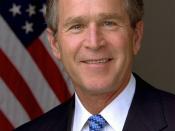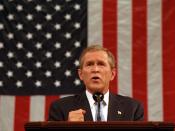The priority placed on national security since September 11 has put civil liberties at risk in a number of countries. These reductions in civil liberties include not only the citizens of Iraq and other Middle Eastern countries that the U.S. has became militarily involved with, but the U.S. citizens as well. According to The Carter Center, the U.S.-led war on terrorism has led to some startling actions by governments. Many governments have adopted anti-terrorist security policies, and some have cracked down on dissidents and human rights defenders. At the heart of the matter, governments say, is the United States and the broadening of its own police powers under the Patriot Act.
The Patriot Act was introduced and passed in the United States legislature after September 11. This document is similar to others that has been passed all over the world. The nature of these legislative doctrines is to provide heightened national security in the absence of many civil liberties.
One of the main ways this is being done is through surveillance. Whether it is more cameras being posted all over every public building, search and seizure of foreign travelers at all public transportation hubs and ports, tapped phones of "suspected persons", or even random arrests and detainment of foreign citizens just because they are reported to have scrutinized the government by either discussing issues with an anti-U.S. tone or just general acts that cause "suspicion", these actions are creating fear among in the world. This fear is controlling and blinding.
One could say that this new induction of fear that has been placed on the world by many world governments is actually a human rights violation in itself. Humans should not have to live in fear, but things like wavering terror alerts and constant news releases that push the subject...


